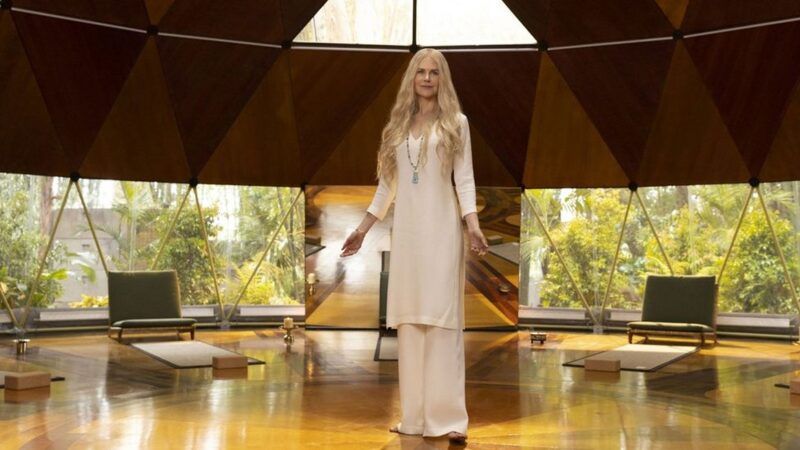Nicole Kidman Leads Nine Perfect Strangers Through Tense New Age Melodrama
David Kelley brings another Liane Moriarty book to life.

Nine Perfect Strangers. Available Wednesday, August 18, on Hulu.
The scene that precedes the opening credits in Nine Perfect Strangers, Hulu's new excursion into health-resort hell, is a perfect metaphor. All these lovely, succulent fruits and vegetables are placed in a sensual food-porn arrangement inside a blender. Then the blades whirl to murderous life, hacking flesh and spitting juice everywhere. The question is, a perfect metaphor for what? The nine resort guests who are the drama's principal characters? Or executive producer David E. Kelley's carefully presented, yet ultimately cockeyed, show? If you figure it out, let me know.
I'm an enormous fan of Kelley's work, which features witty dialogue, fine-hewn characters and tense plot lines. Nine Perfect Strangers has all those things, too, but not consistently and never at the same time. Sometimes it seems to be a lampoon of New Age self-help fads; other times, an encomium to self-lacerating encounter-group culture; and occasionally, a creepy stalker drama. These are not the makings of a good jigsaw puzzle, even when the pieces have the faces of actors like Nicole Kidman, Bobby Cannavale, Melissa McCarthy and Regina Hall.
Adapted from a 2018 book by Australian novelist Liane Moriarty (who also wrote Big Little Lies, the foundation of another Kidman/Kelley package a couple of years ago), Nine Perfect Strangers is about nine clients at an exclusive and expensive California spa called Tranquillum House, the sort of place where everybody is always saying "namaste." Nobody is there for anything as simple as losing a few pounds.
McCarthy plays Frances, a brittle romance novelist whose recent activities have included being catfished and losing her book contract. "I'm not meditating," she says to another guest who inadvertently interrupts her, "just staring into the gaping void."
Even so, she's not by a long shot the most depressed of the clients. That would be the utterly crushed Carmel (Hall, the gloriously scammy Wall Street broker of Showtime's Black Monday) has been dumped for another woman by not just her husband but her kids, too.
The Marconi family is recovering from a tragedy, though not very effectively: Wife Heather (Asher Keddie, Stateless) has gone frigid, daughter Zoe (Grace Van Patten, Under The Silver Lake) is hopelessly alienated, and husband Napoleon (Michael Shannon, The Little Drummer Girl) has nose-dived into power-of-positive-thinking idiocy so profound that he blithely dismisses his son's suicide with the aphorism that "things happen for a reason."
Jessica (Samara Weaving, Ash vs. Evil Dead) and Ben (Melvin Gregg, Snowfall) are trapped in a marital implosion. (He, wondering how much self-help they can stand: "If we keep getting better, eventually we'll be perfect, right? Then what?" She: "You'll be a perfect little asshole.") And gruff single guys Tony (Cannavale) and Lars (Luke Evans, The Alienist) are wrapped up in secret identities that don't stay secret for very long.
The host of this festival of dysfunction is the spa's owner Masha (Kidman), a lightly accented Russian émigré who was a hard-charging CEO until an incident that left a long scar on her chest and a manic conviction in her heart that she can fix everybody. With the guests, she's all warm, humanist sugar-coating; in private, her smiles are predatory and she uses the cold language of manipulation, invoking totalitarian "protocols" that include clandestine surveillance, secret searches of their luggage and background investigations that turn up every broken romance, addiction, blighted organ and family suicide. "They have fairly comfortable lives, most of them," she tells her staffers of the guests. "They come for the suffering."
They certainly get it. Tranquillum House employs every New Age quackery from primal screams to sweat lodges to sack races. At one point Masha even has the clients digging holes and then filling them back up. (Did John Maynard Keynes dabble in psychotherapy?) Kelley treats most of this with the derision it deserves. But he turns serious during the public self-laceration of encounter groups, in which the guests bray ugly secrets about their lives and then smile in relief, as if telling a bunch of gravel-faced strangers that you haven't had sex in three years is curative. And in Nine Perfect Strangers, it seems to be.
It is not, however, very entertaining. Searing self-confessionals can be used to good dramatic affect when used sparingly at climactic moments—think Sophie's Choice or Who's Afraid of Virginia Woolf. But seeing them several times an hour is more like attending a series of public floggings; a treat for S&M voyeurs, cod liver oil for everybody else. There's a reason the Chinese Red Guards didn't sell tickets to their brainwashing sessions with POWs and luckless bourgeoisie. Something about staring into a gaping void.
